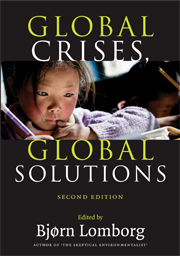Book contents
- Frontmatter
- Contents
- List of figures
- List of tables
- List of contributors
- Acknowledgements
- List of abbreviations and acronyms
- Introduction
- PART I THE CHALLENGES
- 1 Air pollution
- 2 The security challenge in conflict-prone countries
- 3 Disease control
- 4 The benefits and costs of alternative strategies to improve educational outcomes
- 5 Climate change
- 6 Hunger and malnutrition
- 7 Water and sanitation
- 8 The challenge of reducing international trade and migration barriers
- 9 Transnational terrorism
- 10 Women and development
- PART II RANKING THE OPPORTUNITIES
- Conclusion
5 - Climate change
Published online by Cambridge University Press: 05 June 2012
- Frontmatter
- Contents
- List of figures
- List of tables
- List of contributors
- Acknowledgements
- List of abbreviations and acronyms
- Introduction
- PART I THE CHALLENGES
- 1 Air pollution
- 2 The security challenge in conflict-prone countries
- 3 Disease control
- 4 The benefits and costs of alternative strategies to improve educational outcomes
- 5 Climate change
- 6 Hunger and malnutrition
- 7 Water and sanitation
- 8 The challenge of reducing international trade and migration barriers
- 9 Transnational terrorism
- 10 Women and development
- PART II RANKING THE OPPORTUNITIES
- Conclusion
Summary
Multiple changes are occurring simultaneously around the globe at an increasing pace. Energy and resource scarcities have emerged or intensified. Different trade regimes have evolved. New communication and information technologies have exploded into daily life. New human health issues have appeared, and old health issues have, in some cases, been exacerbated. Changes in global climate and associated patterns of extreme weather events must be added to this list, especially for the global poor whose very livelihoods depend directly in many instances on the use of specific natural resources.
The Intergovernmental Panel on Climate Change (IPCC), in its Fourth Assessment Report (AR4, 2007), concluded that a portfolio of mitigation and adaptation will prove to be the best option for dealing with climate change; see IPCC (2007b, 2007c). In this Challenge paper, we provide some additional evidence in support of such a multi-faceted approach – a combination of mitigation, investment in research and development (R&D) on less-carbon-intensive technologies, and adaptation is found to be superior to adopting any single option at the expense of all others. In addition, it will become clear that ignoring climate change would mean that efforts which have been designed to ameliorate many of the other challenges contemplated in the Copenhagen Consensus exercise will ultimately be “swimming upstream” – i.e. expending effort unnecessarily simply to stay in place.
Information
- Type
- Chapter
- Information
- Global Crises, Global SolutionsCosts and Benefits, pp. 236 - 304Publisher: Cambridge University PressPrint publication year: 2009
Accessibility standard: Unknown
Why this information is here
This section outlines the accessibility features of this content - including support for screen readers, full keyboard navigation and high-contrast display options. This may not be relevant for you.Accessibility Information
- 2
- Cited by
